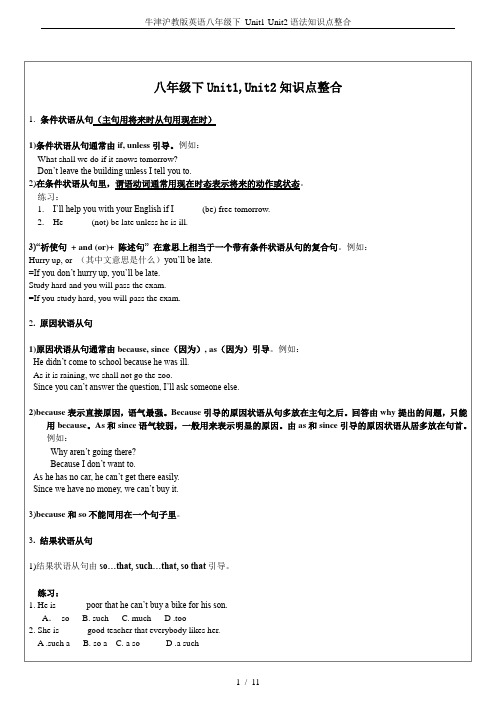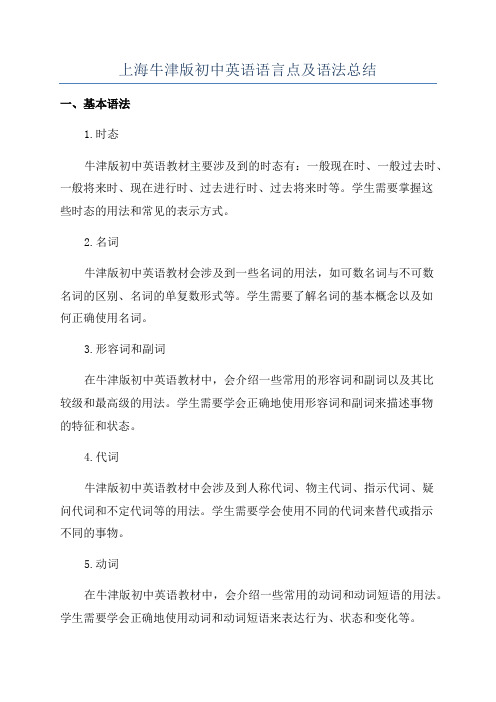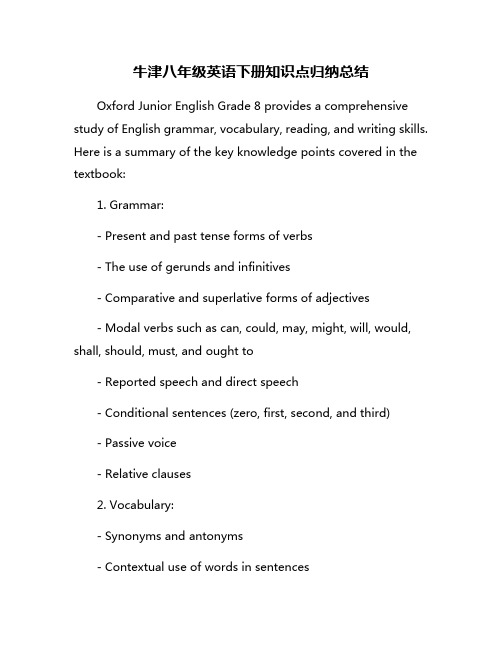上海牛津版八年级下册语法知识点总结综合---宾从,定从,倒装,句子成分
沪教牛津版八下英语语法知识点归纳

沪教牛津版八下英语语法知识点归纳1. Present tense:现在时- 现在时表示目前正在进行的动作或状态:e.g. I am doing my homework.(我正在做作业。
)- 现在时还可以用来表示经常性的动作或习惯:e.g. She always gets up early.(她经常早起。
)2. Past tense:过去时- 过去时表示已经发生的动作或状态:e.g. I went to the park yesterday.(我昨天去了公园。
)- 过去时还可以用来表示过去的习惯或常态:e.g. He used to swim every morning.(他过去每天早上游泳。
)3. Future tense:将来时- 将来时表示将要发生的动作或状态:e.g. We will visit Paris next summer.(我们将会在明夏去巴黎。
)4. Modal verbs:情态动词- 情态动词用来表示说话者的态度、习惯、能力等:e.g. You should study harder.(你应该更加努力学习。
)- 常见的情态动词有can、could、may、might、must、shall、should、will、would等。
5. Passive voice:被动语态- 被动语态表示动作的接受者在句中作为主语:e.g. The cake was made by my sister.(这个蛋糕是由我妹妹制作的。
)6. Reported speech:间接引语- 间接引语用来转述别人所说的话:e.g. She said that she was going to the cinema.(她说她要去电影院。
)7. Adjectives and adverbs:形容词和副词- 形容词用来描述名词或代词的性质或特征:e.g. He is a tall man.(他是一个高个子的男人。
)- 副词用来描述动词、形容词和其他副词的程度、方式等:e.g. She sings beautifully.(她唱得很美。
牛津译林版八年级英语全册语法知识点总结

1.句子结构:a.主语+谓语+宾语b.主语+谓语+间接宾语+直接宾语c.主语+谓语+宾语+宾语补足语d.主语+谓语+宾语+宾语补足语+定语e.主语+系动词+表语f.主语+不及物动词2.时态:a.一般现在时:表示现在经常性、习惯性的动作或状态。
b.现在进行时:表示现在正在进行的动作。
c.一般过去时:表示过去发生的动作或状态。
d.过去进行时:表示过去其中一时刻正在进行的动作。
e.一般将来时:表示将来的动作或状态。
f.将来进行时:表示将来其中一时刻正在进行的动作。
3.语态:a.主动语态:主语是动作的执行者。
b.被动语态:主语是动作的承受者。
4.动词时态和语态的被动形式:a. 一般现在时的被动形式:am/is/are+动词的过去分词。
b. 一般过去时的被动形式:was/were+动词的过去分词。
c. 将来时的被动形式:will be+动词的过去分词。
d. 现在进行时的被动形式:am/is/are+being+动词的过去分词。
e. 过去进行时的被动形式:was/were+being+动词的过去分词。
5.情态动词:a. can:表示能力、允许和请求。
b. may:表示许可、可能性和祝愿。
c. must:表示肯定、必要性和推测。
d. should:表示建议、责任和承诺。
e. might:表示推测、可能和祝愿。
f. would:表示假设、请求和习惯。
6.虚拟语气:a.虚拟语气用于表达虚构、假设、愿望、建议等。
b. 虚拟语气主要涉及以下几个时态:一般过去时、现在将来时、与现在相对的过去将来时、would/could+动词原形。
7.上文一致性:a.当主句用一般现在时态表述,宾语从句中的谓语动词将会保持不变。
b.当主句用过去时态表述,宾语从句中的谓语动词将用相应的过去时态。
总结完毕,以上是牛津译林版八年级英语全册所涉及的主要语法知识点。
语法知识点总结2024-2025学年沪教牛津版英语八年级下册

八下语法知识点总结语法一:to do 不定式•My mother and I will continue to visit Vivien.•I wanted to help disabled children.•We need to help children like Tim and raise their spirits.总结1:_____________________________________练习:We (1) ________________ (decide/ meet) Vivien today. We (2) _______________(want/help) her in some way. When we arrived, Vivien was very happy. She (3) ____________(begin/talk) to me about her school. She said, “I (4) _________ (like/ go) to school, but I don’t have any friends. I feel lonely.”Mum gave her some advice. Then Mum asked me to give Vivien her present, but I (5) _____________(forget/bring) it! Vivien said, “It’s OK. I (6) ___________ (hope/see) you again soon.”•Do you know how to help disabled people?•I know where to go.•She can remember what to say.总结2:_____________________________________练习:1. He doesn’t know ________________(wear).他不知道要穿什么。
牛津沪教版英语八年级下 Unit1-Unit2语法知识点整合

A .don't make B. not make C. not making D .not to make8. An army spokesman stressed that all the soldiers had been ordered _____clear warnings before firing any shots.A .to issue B. being issued C. to have issued D. to be issued9. I'd rather have a room of my own, however small it is, than_______ a room with someone else.A. to shareB. to have sharedC. shareD. sharing10. The bank is reported in the local newspaper_________ in broad daylight yesterday.A. robbedB. to have been robbedC. being robbedD. having been robbed11. A number of paintings in the castle are believed ________in a fire.A. being destroyedB. having been destroyedC. to be destroyedD. to have been destroyed12. The meeting _______ next week is sure to be a great success.A. to take placeB. to be taken placeC. to have taken placeD. being taken place13. As a result of my laziness, I failed ________ my work in time.A. and finishedB. to finishC. and finishingD. to finished14. I am sorry ______ written you a letter at the time.A. to have notB. to not haveC. not to haveD. not having15. Will you lend him a magazine _________?A. to be readB. for readingC. to readD. he read16. He could do nothing but _______for the bus _________.A. wait, to comeB. wait; comeC. waiting; comingD. waited; came17 .It is a problem that doesn't need ________ right now.A. to solveB. solvingC. being solvedD. to be solving18. There's a man at the reception desk who seems very angry and I think he means _______ trouble.A. makingB. to makeC. to have madeD. having made19. I remember _______him _______the bike needed __________.A. hearing, saying, to repairB. to hear, say, to repairC. hearing, say, repairingD. to hear, saying, to be repaired20. --- You should have thanked her before you left.--- I meant _________, but when I was leaving I couldn't find her anywhere.A. to doB. toC. doingD. doing so21. Robert is said to __________ abroad, but I don't know what country he studied in.A. to have studiedB. to study B. to be studying D. to have been studying22. I'm gong to Xi'an next week. Have you anything __________ to your parents?A. to takeB. to be takenC. to be bought toD. to buy23. when are they __________ in their plan?A. handB. handedC. to handD. give24. In such dry weather, the flowers will have to be watered if they _____________.A. have survivedB. are to surviveC. would survivedD. will survive25. When we hurried to the station, there happened ________ no bus at that time.A. to haveB. to beC. havingD. being26. I lost my way in complete darkness and, _________ matters worse, it began to rain.A. madeB. having madeC. makingD. to make27. At ________ time does the salesgirl get up late in the morning, though she is always too busy _________a good rest.A. no, to takeB. no, takingC. any, to takeD. one, taking28. --Are you a student? --No, but I used _________.A. to beB. to wasC. to doD. to be a29. I stopped to listen, and my son seemed _________ himself _________ in the living room.A. to enjoy, to shutB. to be enjoying, shuttingC. to be enjoying, shutD. to have enjoyed, having shut30. With a lot of difficult problems _________, the newly-elected president is having a hard time.A. settledB. settlingC. to settleD. being settled31. We're leaving at six o'clock, and hope _________ most of the journey by lunch time.A. to doB. to have doneC. to makeD. to have made32. The study of the wild world may help to make the world easier _________.A. understoodB. to be understoodC. to understandD. understand33. Who will you get __________ the project for us?A. designB. to designC. designedD. designing34. It is said in Australia there is more land than the government know __________.A. it what to do withB. what to do it withC. what to do with itD. to do what with it35. We are not allowed __________ outdoors with some other children.A. playingB. to be playingC. to playD. be playing36. Allen had to call a taxi because the box was _________ to carry all the way home.A. much too heavyB. too much heavyC. heavy too muchD. too heavy much37. She feels so strongly that each of us should have a role __________in making the earth a better place to live in.A. to have playedB. to playC. to be playedD. to be playing38. When I handed the report to John, he said that George was the person _________.A. to sendB. for sending itC. to send it toD. for sending it to39. Do let your mother know all the truth, she appears _________ everything.A. to tellB. to be toldC. to be tellingD. to have been told11 / 11。
上海牛津版初中英语语言点及语法总结

上海牛津版初中英语语言点及语法总结一、基本语法1.时态牛津版初中英语教材主要涉及到的时态有:一般现在时、一般过去时、一般将来时、现在进行时、过去进行时、过去将来时等。
学生需要掌握这些时态的用法和常见的表示方式。
2.名词牛津版初中英语教材会涉及到一些名词的用法,如可数名词与不可数名词的区别、名词的单复数形式等。
学生需要了解名词的基本概念以及如何正确使用名词。
3.形容词和副词在牛津版初中英语教材中,会介绍一些常用的形容词和副词以及其比较级和最高级的用法。
学生需要学会正确地使用形容词和副词来描述事物的特征和状态。
4.代词牛津版初中英语教材中会涉及到人称代词、物主代词、指示代词、疑问代词和不定代词等的用法。
学生需要学会使用不同的代词来替代或指示不同的事物。
5.动词在牛津版初中英语教材中,会介绍一些常用的动词和动词短语的用法。
学生需要学会正确地使用动词和动词短语来表达行为、状态和变化等。
6.句子结构牛津版初中英语教材中会涉及到一些句子的结构,如肯定句、否定句、一般疑问句和特殊疑问句等的构成方式和用法。
学生需要学会正确地构造各种不同类型的句子。
7.从句牛津版初中英语教材中会介绍一些常用的从句的用法,如宾语从句、定语从句和状语从句等。
学生需要学会理解从句的作用和用法,并正确地构造各种不同类型的从句。
二、语言点1.日常交际用语牛津版初中英语教材中注重培养学生的交际能力,会提供一些日常生活中常用的交际用语。
学生需要学会运用这些用语与他人进行正常的日常交流。
2.生活常识和文化知识牛津版初中英语教材中会涉及到一些生活常识和文化知识,如国家、城市、节日、传统习俗等。
学生需要了解这些常识和知识,扩大自己的视野和知识面。
3.阅读理解和听力牛津版初中英语教材中提供了一些阅读理解和听力训练的材料,帮助学生提高自己的阅读理解和听力技能。
学生需要通过阅读和听力训练,培养自己的语言理解和应用能力。
4.写作技巧牛津版初中英语教材中会介绍一些写作技巧,如如何写日记、如何写情书、如何写旅行日志等。
牛津八年级英语下册知识点归纳总结

牛津八年级英语下册知识点归纳总结Oxford Junior English Grade 8 provides a comprehensive study of English grammar, vocabulary, reading, and writing skills. Here is a summary of the key knowledge points covered in the textbook:1. Grammar:- Present and past tense forms of verbs- The use of gerunds and infinitives- Comparative and superlative forms of adjectives- Modal verbs such as can, could, may, might, will, would, shall, should, must, and ought to- Reported speech and direct speech- Conditional sentences (zero, first, second, and third)- Passive voice- Relative clauses2. Vocabulary:- Synonyms and antonyms- Contextual use of words in sentences- Phrasal verbs- Idioms and expressions- Prefixes and suffixes- Homophones and homographs- Word formation (nouns, verbs, adjectives, adverbs)3. Reading:- Comprehension passages with different text types (narrative, descriptive, expository, persuasive)- Identifying main ideas and supporting details- Inference and predicting outcomes- Summarizing texts- Recognizing literary devices (simile, metaphor, personification, alliteration, onomatopoeia)4. Writing:- Paragraph and essay writing- Narrative, descriptive, and argumentative writing- Using appropriate linking words and phrases- Organizing ideas cohesively- Structure of a formal letter and email- Creative writing techniquesOverall, the Oxford Junior English Grade 8 textbook offers a well-rounded English language curriculum that helps students improve their language skills in grammar, vocabulary, reading, and writing. By mastering these knowledge points, students can better communicate and express themselves effectively in English.。
牛津译林版英语八年级下册笔记整理(考点1-40) PDF

8B 笔记整理(考点1 ~ 40)1. 现在完成时的信号词:2. 现在完成时的基本结构:肯定句:主语+ have / has + 过去分词否定句:主语+ have / has + not + 过去分词一般疑问句:Have / Has + 主语+ 过去分词3. used to do sth. 过去常常做某事;used to be 过去曾是…be used to doing sth. / get used to doing sth. 习惯做某事注意:观察used 前面有没有be 动词或者get / got4. Asia 亚洲Asian 亚洲的/ 亚洲人Europe 欧洲European 欧洲的/ 欧洲人Africa 非洲African 非洲的/ 欧洲人America 美洲American 美洲的/ 欧洲人* a European country 虽然元音字母开头,但是发音为辅音,所以用a* Americans and Europeans 美洲人和欧洲人; Asians and Africans 亚洲人和非洲人5. Canada 加拿大Canadian 加拿大的/ 加拿大人;Australia 澳大利亚Australian 澳大利亚的/ 澳大利亚人;Germany 德国German 德语/ 德国人的/ 德国人France 法国Fr e nc h 法语/ 法国人的/ 法国人注意:名词所有格Canadian s’ books 那些加拿大人的书the Canadian’s book 那个加拿大人的书6. ①mind doing sth.介意做某事Do you mind my opening the window? / Do you mind me opening the window?②Never mind. (口语交际)没关系,不介意③ A moment of fear went through my mind. 【名词】头脑,大脑7. 句型The best time to do sth.The best time to visit the UK is … / from … to …Sunshine Park is a wonderful place to fly kites.* 与time / place 相关的句型(表示最佳时间、最佳地点)使用to do 结构;* 短语have a good time doing sth. 使用doing 结构8. east 东方east ern东方的;west 西方west ern西方的;south 南方south ern南方的;north 北方north ern北方的;at the southern end of …在…的最南端;Western restaurants 西餐馆(表示西方文化、艺术的时候需要大写)9. can’t help / stop doing sth. 情不自禁做某事/ 忍不住做某事stop doing sth. 停止正在做的事;stop to do sth. 停下手中的事去做一件新事情10. to do 不定式表示目的(理解句意,在翻译句子的基础上理解目的的表达)We must try our best to stop the pollution to live (live) a happy life. 为了…11. be interested in doing sth. She is interested in reading novels. 对…感兴趣show an interest in doing sth. She shows an interest in reading novels.interested (感到)有兴趣的interesting 令人感兴趣的bored (感到)无聊的boring 令人感到无聊的excited (感到)兴奋的exciting 令人感到兴奋的relaxed (感到)放松的relaxing 令人放松的12. 序数词第…in the early / late twentieth century 在(第)二十世纪早/晚期区分:in the / one’s thirties 名词复数形式意思是30~39之间She is in his thirties.thirtieth 序数词意思是第三十celebrate her thirtieth birthday基数词变序数词14. hear / see sb. do sth. 听见/看见某人做事的全过程hear / see sb. doing sth. 听见/看见某人做事的一瞬间注意:经常听见或看见的是全过程I often hear the birds sing.比较级的基本结构:比较级+ than最高级的基本结构:the + 最高级16. 区分:形容词的比较级和形容词变副词* I find it easier than before to complete the task.* Susan can work out the problem easily. 轻松地解决难题副词修饰动词* 修饰比较级much / even / a little + 比较级+ than* 注意:further information / study / help …(程度)更进一步的;Further on …再往前区分:tasty = delicious 美味的;tasteful 有品味的;雅致的18. 反义词前缀un-, in-, im- 意思是not注意:读懂句意,准确判断词性,在理解句子意思的基础上补充词缀。
牛津译林版英语八年级下册 Unit 1 语法、词汇、句型知识点总结(详细版)

牛津译林版英语八年级下册Unit 1 语法、词汇、句型知识点总结(详细版)8B Unit 1 Past and presentComic strip & Welcome to the unit1.I've just eaten it.我刚才把它吃了。
just此处用作副词,意为“刚刚,刚才”,通常与现在完成时连用。
Mr Wang has just left our classroom.王老师刚刚离开我们的教室。
I've just heard the news.我刚听到这个消息。
拓展:①just 副词,还可意为“正好,恰好;仅仅,只是”,起加强语气的作用。
This jacket is just my size.这件夹克衫正合我的尺码。
That's just what he wanted.那正是他所要的。
He is just a child.他仅仅是一个孩子。
I just want to talk to you.我只是想和你谈谈。
①just now意为“刚才,刚刚”,相当于a moment ago,常用于句末,用于一般过去时态的句子中。
I met one of my friends in the street just now.我刚才在街上遇到了我的一个朋友。
①just then 意为“就在那时”。
Just then, someone knocked at the front door.就在那时,有人敲了敲前门。
2.Why?为什么?这是一个省略问句,其完整形式是“Why did you eat my food?”。
why引导的特殊疑问句用来询间原因,通常用because(因为)引导的句子来回答。
—Why didn't you come to the meeting yesterday?你昨天为什么没来参加会议?—Because I had a bad cold.因为我患了重感冒。
- 1、下载文档前请自行甄别文档内容的完整性,平台不提供额外的编辑、内容补充、找答案等附加服务。
- 2、"仅部分预览"的文档,不可在线预览部分如存在完整性等问题,可反馈申请退款(可完整预览的文档不适用该条件!)。
- 3、如文档侵犯您的权益,请联系客服反馈,我们会尽快为您处理(人工客服工作时间:9:00-18:30)。
➢简单句---五种基本句型1)主语+ 不及物动词【主谓】The dog died.2) 主语+ 及物动词+ 宾语【主谓宾】I teach English.3)主语+动词+间接宾语+直接宾语【主谓宾宾】She sent me a present. 4)主语+ 及物动词+宾语+ 宾语补足语【主谓宾宾补】5)主语+ 系动词+表语【主系表】➢并列句---由并列连词【fanboys】连接的句子。
fanboys: for, and, nor, but, or, yet, so1. 注意就远原则、就近原则2. 注意逻辑语义关系。
➢主从复合句从句的语序:陈述语序--- 引导词后紧跟从句的主语。
【注意特例】:特殊疑问词本身做主语的时候,改为宾从的时候,语序不变。
what’s wrong / the matter/the problem (with…)which is the way to…what is the most beautiful ….what is happening over there…who is standing there…3) 时态主现从不限,主过从必过,真理永一现。
注意:在改写宾从的时候,1)如果主句是一般过去式,从句要用相应的过去时态。
2)注意人称变化;3)注意时间状语的变化3.定从考点梳理注意:只能用that 的情况1. 先行词是all, few, little, much, something, anything, everything 等不定代词2. 先行词由only , very 修饰3. 先行词被最高级、序数词修饰4.先行词中既有人又有物非限制性定语从句:特点:先行词与定语从句之间有逗号隔开which引导:先行词既可以是一个单词,也可以是一整个句子as 引导:可参考常见搭配:as sb expectedas is mentioned beforeas is well-known4. 状语从句重点连接词时间状语从句since---自从;与现在完成时连用as soon as –一…就not … until…直到….才…原因状语从句since;as目的状语从句so that让步状语从句:though/although/even if/ even though, 不与but 连用条件状语从句:if, unless, as/so long as方式状语从句:as(按照),as if/as thoughPart Three 倒装句--- NAOSHI原则NAOSHI----N--- negative words 【当句首出现否定意义成分,需要进行部分倒装】●NAOSHI----A (as / though 引导的让步状语从句)分词/名词(无冠词)/短语+ as/though + 主语+ 谓语Although/Though I was very tired, I tried to help them.= Tired as/ though I was, tried to help them.Though she is a girl, she behaves like a boy.= Girl as/though she is, [ 此处强调部分为a + n单时;倒装时不用加a]●NAOSHI—o : only + 状语(adv./ 介词短语/状从)+ 助动词+主语+动词(部分倒装)Only then did he realize his mistake.Only in this way can you learn English well.Only when you finish your homework can you watch TV. [从句不倒装,主句倒装]注意易错:Only you can go to school. 【only 后不接状语,不用倒装。
此句only 修饰的是主语】●NAOSHI—s==so, neitherSo did I . 我也是So I did. 确实如此I did so. 我做过这件事。
1.So+ 助动词+主语;表示“也…” Neither/Nor + 助动词+主语: 表示“也不…”【拓展固定结构】:So it is with… 表示前面提及的事也适合后者。
Man can’t l ive without water or air. So it is with animals.人不能离开水和空气。
动物也是如此。
NAOSHI—H:Here 等引导的地点状语(方向)、时间状语,位于句首时,要用完全倒装。
Here comes the bus.In front of you sits Timy.Hearing Timy’s homework, away fled the students.常见标志词:here, there, now, then, away, off, in, out, up , down 等+ 介词短语易错:当主语是人称代词的时候,不用完全倒装。
Away they went.Away went the students.Out went the man.Out he rushed.*NAOSHI—I : if 引导的虚拟从句;若省略if,从句要用倒装结构来表达结构:Were +主语+其他;Had +主语+过去分词+其他;should +主语+动词原形+其他= were +主语+ to do + 其他If I were a boy, I would marry you.Were I a boy, I would marry you.If I had known this, I would have told you.Had I know this, I would have told you.________ here tomorrow, he would show us his new pictures.A. Were he to comeB. Should he comeC. Had he comeD. A and BPart Four 时态综合1. 一般现在时:表示经常,习惯的动作/状态;真理;名人名言标志词:often, always, usually, sometimes, once a week, every day考点:1)真理永一现Our teacher told us the earth _goes____ around the sun. (go)2)时间/条件状从:主将从现,主祈从现,主情从现If it rains tomorrow, we won’t go to the park.2.一般过去时:过去发生的动作或状态标志词:yesterday; last… , …ago, in 1998, just now, used to do考点:used to do sth 过去常常做be used to doing sth 习惯于做某事be used to do sth 被用来做某事3. 一般将来时:将要发生/计划发生的动作标志词:tomorrow, next week, in the future, in + 时间段, in 2100,考点:be going to →主观判断据现有迹象判断将发生will →客观必然; 无迹象He is seriously ill. He is going to die.He will be twenty years old.4.进行时✓现在进行时:1)说话时正在发生的动作2)最近一段时间持续进行的动作标志词:现在此刻看和听;最近在哪要小心。
(now, at this moment; look; listen; these days; where is …; Be careful! )✓过去进行时:1)过去某个时刻的动作2)过去某个时间段持续的动作标志词:then, at that time, yesterday, at ten yesterday6.现在完成时:标志词:already, yet, since, for, never, ever, just , before, so far, until now, in the past few years 考点:1)现在完成时→过去发生的事对现在有影响2)瞬间动词不能与for+ 时间段;since+从句/过去时间点,how long;瞬间动词转换成延续动词7. 过去完成时:过去的过去构成:had +done (过去分词)标志词:by + 过去的时间点;by the end of + 过去时间点;before + 过去的时间点固定搭配:had no sooner done than sb did sth ; had hardly/scarcely done when sb did sth考点:直接引语→间接引语She said, “My brother came to see me last week.”→She said (that) her brother __________to see her the week before.8. 过去将来时:从过去某时看,将要发生的动作或者状态构成:would do ; was/were going to do标志词:soon, the nest day, the next month, the next year。
